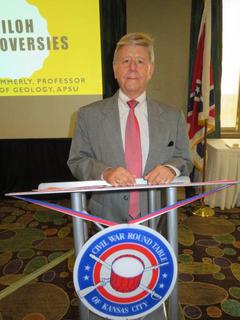
Phillip R. Kemmerly is Professor Emeritus of Geology in the Department of Geosciences at Austin Peay State University, Clarksville, Tennessee. Professor Kemmerly retired in 2011 and completed his post-retirement teaching in hydrogeology and Environmental Geology in May 2015. Phil did his bachelor’s and master’s degrees at Kansas State University in chemistry and earth science. Phil completed his doctoral work in environmental geology at Oklahoma State University in 1973. He taught geology for thirty-nine years of which twelve years he served as department chair. He holds professional geologist licenses to practice in both Tennessee and Kentucky. Dr. Kemmerly has been a geological consultant for more than thirty-five years to corporations, law firms, local, state, and national government specializing in sinkholes and ground-water problems in limestone terranes. Phil authored two monographs on karst processes and more than fifty refereed papers in national and international publications. He led field trips dealing with karst topography in Tennessee and Kentucky for national and international geologists as well as geotechnical engineers. He served for many years as an instructor of in-service workshops for the National Association of Ground-water Scientists. He was a member of the Karst Geomorphological Research Group at Oxford University for his entire career at APSU. Phil published three papers with the Karst Geomorphological Research Group, the last of which was published in 2010. He also has co-authored two papers in a Slovakian geological journal in both English and Slovak.
Phil’s interest in history goes back to his high school years when he won the Daughters of the American Revolution American History Award given to the outstanding American history student in Kansas based upon a standardized state-wide examination. He has read military history in his leisure time since high school. His favorite period is the Civil War. In retirement, Phil has applied hydrology, geology, meteorology, physics, soil mechanics, statistics, and mathematics to problems of Civil War combat in Tennessee. He has given talks to several Middle Tennessee Civil War Roundtable Groups since retirement. Phil’s Civil War articles include: (1) “Into the Muck and Mire: Mud, Soils, and Sediments of Shiloh” published in the Spring 2014 issue of the Tennessee Historical Quarterly 2014; (2) “Fighting and Dying in A Frozen Hell: The Impact of Ice, Snow, Fog, and Frozen-hard Ground on the Battle of Nashville” in the Summer 2015 issue of the Tennessee Historical Quarterly; (3) “Lew Wallace’s Controversial March to Shiloh: A Time-Distance-Rate Analysis” in the Winter 2016 issue of the Tennessee Historical Quarterly; (4) “ Environment and the Course of Battle: Flooding at Shiloh (6-7 April 1862)” in the October 2015 issue of the Journal of Military History; (5) “Defending the Final Line at Shiloh,” in the August 2017 issue of Naval History. The Naval History article recognizes for the first time in the historical literature the unrecognized role played by the USS Lexington and USS Tyler in saving General Ulysses S. Grant’s army on the first day at Shiloh; and (6) “Dead Animals, Starving Men, and Treacherous Anderson Road: 1863 Siege of Chattanooga” in the 2018 Summer issue of Tennessee Historical Quarterly. This project deals with the role geology, soil mechanics, meteorology, and geomorphology played in complicating Federal efforts to feed themselves and break the fall 1863 siege of Chattanooga.
He currently has in review an article dealing with how acoustic shadow effects explain John Bell Hood’s debacle at Spring Hill, Tennessee in late 1864. Historians have speculated for one hundred and fifty years how General John M. Scofield’s IV Corps of the Army of the Cumberland and XXIII Corps of the Army of the Ohio escaped entrapment by Hood’s Army of Tennessee along Franklin Pike during the night of November 29/30, 1864.